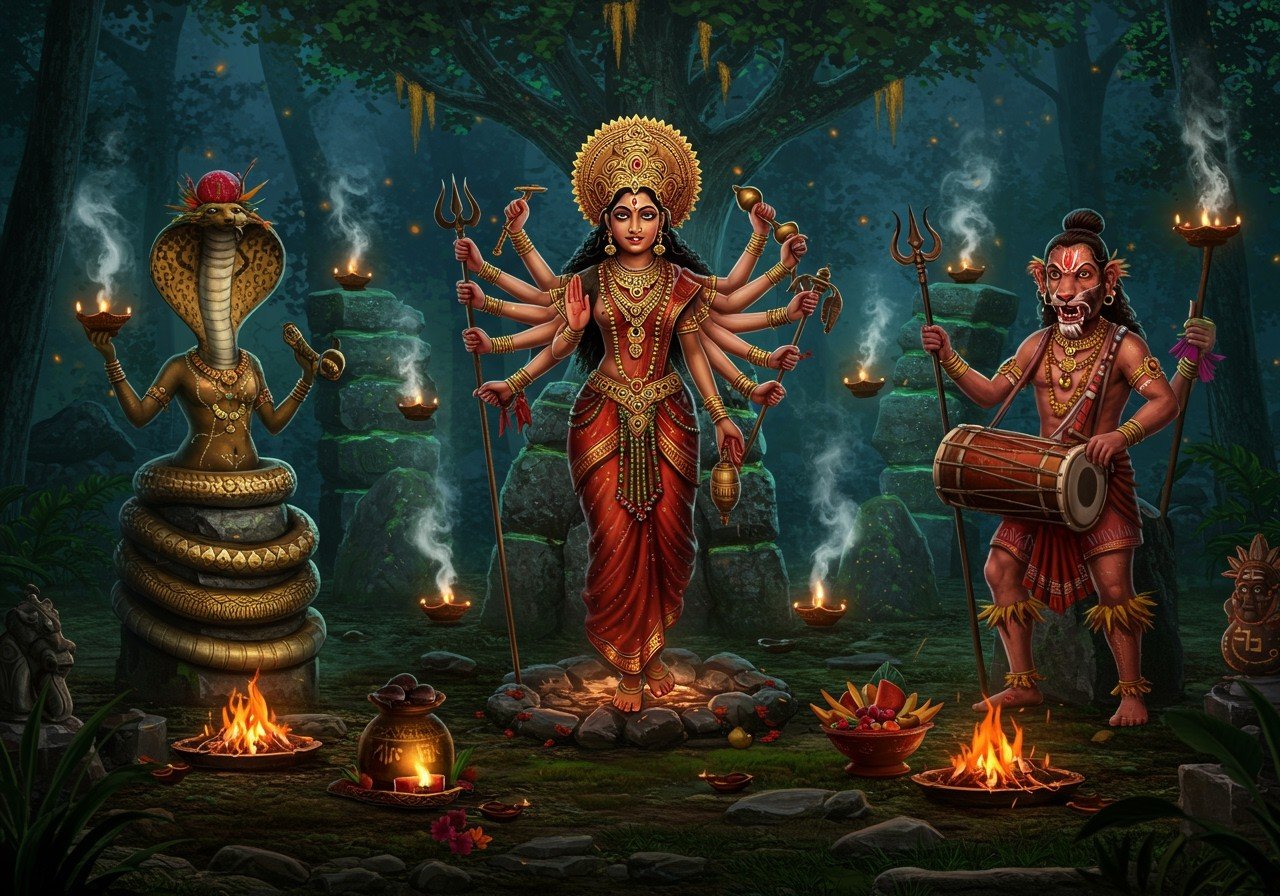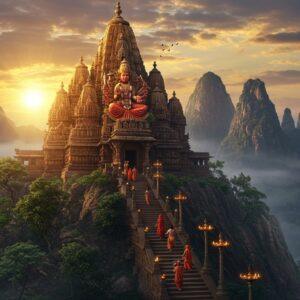
Deep within India’s rich cultural heritage lies a profound reverence for tribal deities. These ancient gods and goddesses, embodying the forces of nature, ancestral spirits, and cosmic energies, deeply enrich the spiritual lives of tribal communities. Exploring their significance offers a glimpse into the vibrant traditions and beliefs that flourish across diverse regions and communities. For many Indians connected to their cultural roots, understanding tribal deities enhances their appreciation for our shared history.
Tribal Gods and Goddesses: Unique Divine Protectors
Tribal societies maintain their unique pantheons of gods and goddesses, each serving as protectors, healers, and providers. For instance, the Warli tribe venerates Palaghata, the goddess of fertility and prosperity, while the Santals worship Marang Buru, the majestic mountain god. These revered figures are intrinsically linked to nature, profoundly influencing tribal art, music, and dance. Traditional rituals and festivals often portray these divine figures, showcasing their vital role in everyday life. Interestingly, some tribal deities have integrated into mainstream Hinduism, reflecting a fascinating syncretic tradition.
Myths and legends, passed down through generations by oral tradition, add depth and complexity to tribal beliefs. Creation myths and heroic tales illuminate moral values and reinforce community identity. These narratives often depict cosmic battles, emphasizing the intricate connection between nature and culture. Tribal elders play a crucial role in preserving these stories, ensuring their relevance for future generations. Today, these legends continue to resonate, imparting timeless wisdom.
Deities permeate every aspect of tribal life. Ritual worship sustains harmony with nature and the divine. Agricultural cycles, hunting practices, and seasonal celebrations are often structured around these spiritual practices. Deities also play a significant role in governance and conflict resolution, with shamans acting as intermediaries between the human and spiritual realms. While modernization poses challenges to traditional worship, a growing revival and adaptation of these practices are underway. You can learn more about Hindu Gods and Goddesses in this comprehensive guide.
The cultural significance of tribal deities lies in preserving identity amidst external influences. Efforts to document and safeguard these beliefs are essential. Museums, cultural organizations, and dedicated researchers contribute significantly to protecting this invaluable heritage. Community-led initiatives further strengthen traditional knowledge and spirituality. While blending tribal spirituality with modern life presents challenges, education and awareness promote respect and understanding. Discover more about meditation challenges and breathing exercises for meditation.
Understanding tribal deities enriches our appreciation of India’s diverse cultural tapestry. By engaging with these ancient beliefs, we draw inspiration from their wisdom and relevance in the present day. Embracing traditional practices harmoniously with modern life is a testament to respecting and celebrating our shared heritage. For further exploration, delve into the world of Krishna, Vishnu, and Indra.
How Poojn.in Can Help You Connect with Tribal Deities
Poojn.in offers a wide selection of essential items and resources for worshipping tribal deities in authentic ways. The platform provides:
- Complete puja samagri kits tailored for tribal deity worship, ensuring you have everything you need for a respectful ceremony. These kits are designed for convenience and authenticity.
- Traditional items like dhoop, agarbatti, and special offerings, allowing you to create a sacred atmosphere for your worship. Each item is carefully selected for its traditional significance.
- Authentic brass and copper idols of tribal deities, crafted with precision and reverence to serve as focal points for your devotion. These idols are made with high-quality materials and attention to detail.
- Sacred threads and protection amulets, imbued with spiritual significance, to enhance your connection with the divine. These items are sourced from trusted artisans.
- Natural ingredients traditionally used in tribal worship rituals, ensuring the authenticity of your practice. The ingredients are ethically sourced and of the highest quality.
- Expert guidance on proper worship methods, providing valuable insights and support for your spiritual journey. Our experts are knowledgeable in tribal traditions and rituals.
At Poojn.in, you can find items related to major tribal deities including:
- Lord Garuda: The divine eagle vehicle of Lord Vishnu, representing strength and devotion. Find exquisite statues and other items related to Garuda on our platform. Learn more about Hayagriva Madhava Temple where Garuda plays an important part.
- Local forest deities and nature spirits: Honor the guardians of the natural world with offerings and rituals specific to your region. We offer a wide selection of items to facilitate your connection with these entities.
- Regional tribal guardian deities: Connect with the protectors of your ancestral lands and seek their blessings. Discover items specifically related to your regional deities on Poojn.in.
- Sacred grove deities: Pay homage to the spirits residing in sacred groves and maintain harmony with nature. Our selection includes items traditionally used in sacred grove rituals.
Poojn.in ensures:
- Quality-checked authentic items: We guarantee the authenticity and quality of our products, sourced from trusted suppliers.
- Safe packaging of sacred materials: Your sacred items will be packaged with care and respect to ensure they arrive in perfect condition.
- Pan-India delivery: We deliver across India, making our products accessible to everyone.
- Expert verification of ritual items: Our experts ensure the accuracy and authenticity of all ritual items.
- Detailed product descriptions in simple language: We provide clear and concise product information to help you make informed choices.
- Competitive pricing: We offer high-quality products at competitive prices.
Shop for tribal deity worship items at www.poojn.in – India’s largest online store for authentic puja samagri. All products come with proper usage instructions and are carefully sourced from verified suppliers. You can also find specific products such as Lord Shiva Murti and Mangalam Camphor.
[Note: Product availability may vary. Please check the website for current stock.]
Embracing the Legacy of Tribal Deities
Tribal deities are more than ancient symbols; they represent living connections to India’s vibrant cultural tapestry. These divine figures remind us of the profound bond between humanity and nature, offering timeless wisdom and guidance. By learning about these unique traditions, we gain a deeper understanding of the resilience and strength of tribal communities. Embracing these beliefs in our present lives honors our shared history and celebrates the diversity that defines us. Respecting and preserving these traditions ensures that the wisdom of tribal deities continues to inspire future generations. Explore festivals like Holi and Raksha Bandhan to further understand Indian culture.
Understanding Tribal Deities and Their Importance
What are tribal deities? Tribal deities are gods and goddesses worshipped by indigenous communities, holding profound cultural and spiritual significance. They are often associated with natural forces, ancestral spirits, and local legends.
Why are tribal deities important in tribal life? Tribal deities serve as guides, protectors, and sources of wisdom in tribal communities. They play a crucial role in moral values, rituals, and daily life, influencing everything from hunting practices to seasonal celebrations.
How do myths and legends shape beliefs in tribal deities? Myths and legends provide context and depth to the beliefs surrounding tribal deities. These stories often explain the origin of the tribe, the powers of the deities, and the importance of rituals, reinforcing faith and tradition.
What is the role of tribal deities in nature? Tribal deities are often seen as guardians and embodiments of nature. They represent elements like the sun, moon, rivers, and forests, emphasizing the interconnectedness between humans and the natural world. Tribes honor these deities to maintain balance and harmony with their environment.
Are there specific rituals associated with tribal deities? Yes, each tribe has unique rituals associated with their deities, involving dance, music, offerings, and storytelling. These rituals are performed during festivals, significant life events, or to seek divine guidance and intervention.
How do tribal gods and goddesses differ from mainstream deities? Tribal deities are typically more localized and specific to a particular tribe and their ancestral lands, unlike mainstream deities who have a wider following. Their stories and attributes reflect the unique experiences and history of the tribe. However, sometimes there is overlap and integration between tribal and mainstream religious traditions.
Can you name some tribal gods and goddesses? Each tribe has its own pantheon of gods and goddesses. For example, some Indian tribes worship deities like Dharti Mata (Earth Mother) and Baghesur (Tiger God), each representing different aspects of life and nature. Other examples include Palaghata, the goddess of fertility and prosperity worshipped by the Warli tribe, and Marang Buru, the great mountain god of the Santals. Check out more about the goddess Manasha here.
Ancient cultures often featured gods and goddesses with unique powers and responsibilities. Here are some examples from different mythologies:
Greek Gods and Goddesses:
The Olympian gods resided on Mount Olympus, immortal and possessing human-like qualities. The twelve primary Olympians include:
- Zeus (Jupiter): King of the gods, ruler of weather, law, and destiny. His symbols are the thunderbolt, eagle, and oak tree. Zeus was considered the most powerful of the Olympian gods.
- Hera (Juno): Queen of the gods, protector of women and marriage. Known for her jealousy and vengeance toward Zeus’s infidelities. Hera played a significant role in various myths and stories.
- Poseidon (Neptune): God of the sea, earthquakes, and horses. He was a powerful and temperamental god, often depicted with a trident. Poseidon’s influence extended over all bodies of water.
- Demeter (Ceres): Goddess of agriculture, harvest, and fertility. Associated with the cycle of life and death, and the nurturing of the earth. Demeter’s worship was central to agricultural societies.
- Athena (Minerva): Goddess of wisdom, reason, strategic warfare, and crafts. Born from Zeus’s head, she was a powerful and intelligent goddess. Athena was the patron goddess of Athens.
- Apollo: God of music, poetry, light, healing, and prophecy. Associated with the sun, archery, and truth. Apollo was revered for his artistic and intellectual pursuits.
- Artemis (Diana): Goddess of the hunt, wilderness, wild animals, the moon, and childbirth. Twin sister of Apollo, she was a fierce and independent goddess. Artemis was associated with the protection of nature.
- Ares (Mars): God of war, violence, and bloodshed. Often depicted as a bloodthirsty and impulsive god. Ares represented the destructive aspects of war.
- Aphrodite (Venus): Goddess of love, beauty, and desire. Born from the sea foam, she was a symbol of passion and romance. Aphrodite’s influence extended over both gods and mortals.
- Hephaestus (Vulcan): God of fire, metalworking, crafts, and blacksmiths. The only physically imperfect god, he was known for his skill and artistry. Hephaestus created weapons and armor for the gods.
- Hermes (Mercury): Messenger of the gods, god of trade, thieves, travelers, sports, athletes, and border crossings, guide to the Underworld. His symbols include the caduceus, winged sandals, and winged cap. Hermes was known for his speed and cunning.
- Dionysus (Bacchus): God of wine, celebration, ecstasy, theatre, and fertility. Associated with revelry and the liberation of the spirit. Dionysus’s worship involved theatrical performances and festivals.
Other gods and goddesses sometimes included among the Olympians are Hades (Pluto), god of the underworld; Hestia (Vesta), goddess of home and family; and Eros (Cupid), god of love and desire.
Egyptian Gods and Goddesses:
One popular creation myth focuses on the Ennead, a group of nine deities:
- Atum: The first god and creator of the world, emerging from the primordial waters. Atum was considered the source of all creation.
- Geb: God of the earth and fertility, often depicted reclining. He represented the solid ground upon which life flourished.
- Nut: Goddess of the sky, portrayed as a woman arched over the earth. Nut was believed to swallow the sun each night and give birth to it each morning.
- Hathor: Goddess of love, joy, music, motherhood, and fertility, frequently associated with women and childbirth. Hathor was a powerful and benevolent goddess, often depicted with cow horns.


